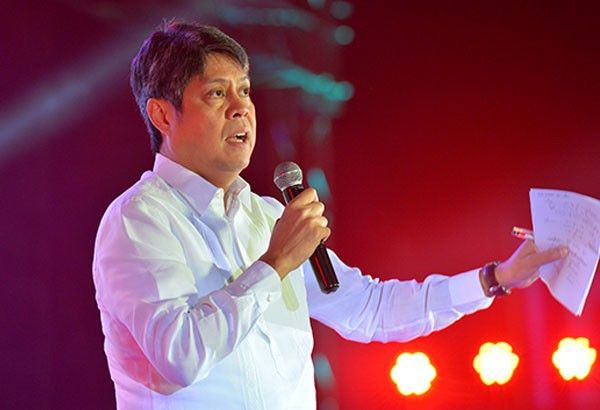Pangilinan warns of 10-year term extension for Duterte

Sen. Francis "Kiko" Pangilinan warned that there were moves to extend the terms of President Rodrigo Duterte and other government officials by 10 years. File
MANILA, Philippines — Sen. Francis "Kiko" Pangilinan on Thursday slammed moves to change the 1987 Constitution, saying there are plans to extend the terms of President Rodrigo Duterte and many elected officials and remove restrictions on the exploitation by foreigners of the country's natural resources.
Pangilinan's criticism of the moves to modify the chapter comes as Speaker Pantaleon Alvarez is eyeing to convene the Senate and the House of Representatives into a constituent assembly this January and submit a draft of the new Constitution to a plebiscite in May.
The Liberal Party president said there were talks in Congress that there would be a 10-year transition period and term extension for Duterte and lawmakers.
"Aside from Duterte, all congressmen and senators will be given term extensions. Since there are no elections, this means no expenses for politicians because no one will step down from his position," Pangilinan said in a statement.
READ: Alvarez: No election in 2019 possible but not Duterte term extension
Pangilinan said that local officials would be appointed during the said 10-year period and the president would be given powers to craft laws similar to those given to the late dictator Ferdinand Marcos while the federal government had not been set up yet.
"Restrictions on foreign exploitations of natural resources will be removed, so China can freely enter the Philippine market and pour billions into the economy," Pangilinan said.
"The people want jobs, affordable food and additional income, not Chacha (charter change)!" he said.
READ: Duterte to cut short his term after shift to federalism
According to Alvarez, drafting a new Constitution can be done in four to five months as there have been studies and consultations done in the past which can serve as the basis of a new charter.
"This January, I will talk to him (Senate President Aquilino Pimentel III) to convene Congress into a constituent assembly to start deliberations on the new Constitution," Alvarez said in a mix of Filipino and English in a radio interview.
He said in a separate radio interview on Wednesday that once a constituent assembly had been convened a technical working group composed of legal experts from the academe would be formed to write a new chapter that would supplant the 1987 Constitution.
READ: Federalism: What Filipinos need to know
The technical working group's proposed Constitution, according to Alvarez, will then be deliberated on by the members of the constituent assembly.
The speaker said that once approved by the assembly, the draft Constitution would be submitted to the people for a plebiscite, most likely to be held simultaneously with the May 2018 village elections.
The 1987 Constitution enumerates three modes through which the charter can be changed or altered. The first is through a constitutional convention which would entail the election of delegates from different legislative districts. Constituent assembly meanwhile would not necessitate special elections as the current members of Congress would act as the drafters of the new Constitution. The last mode, people's initiative, could be used to propose amendments to the document.
Alvarez said the new Constitution would pave the way for the shift to a federal form of government where a president and prime minister could be elected and chosen.
"The president will act as head of state while the prime minister will function as head of government," he said, adding that his preference is to transfer the current bicameral Congress into a unicameral body.
READ: Duterte: Filipinos not yet ready for federalism
Sen. Panfilo "Ping" Lacson said the floating of a no-election scenario and the possibility of term extension for officials would not help the advocacy to shift to federalism.
"The opposition need not invent the best antidote to charter change. No less than the two leaders of both houses of Congress have started campaigning against it, albeit subliminally," he said in a statement.
- Latest
- Trending





























